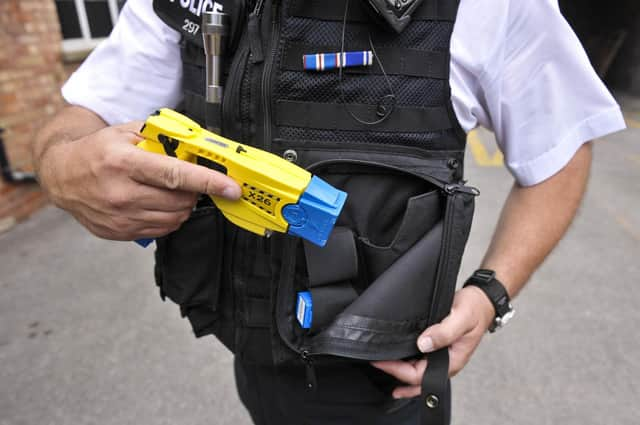Four times more Scottish police officers set to be armed with tasers


The move, detailed in papers for the Scottish Police Authority (SPA) meeting on Wednesday, follows a “gradual, but sustained increase” in the number of officers being assaulted and alongside a rise in the number of incidents involving weapons.
Chief Constable Iain Livingstone said the number of specially trained officers (STOs) who carry a taser will rise from 500 to around 2,000 officers over the next three years.
Advertisement
Hide AdAdvertisement
Hide AdThe police chief said it followed a “period of extensive engagement”.
In the paper, Mr Livingstone added: “The revised model is being introduced in response to a strategic risk assessment which identified that in recent years, there has been a gradual, but sustained increase in the number of assaults on officers and staff in Scotland, along with a rise in incidents involving weapons.
“The increase in STO capability will enhance our capability to deal with significant threats to public safety in a responsive and proportionate manner, and provide our people with the tools they need to do their job as safely as possible.”
Speaking at the public SPA meeting, the chief constable said tasers were a “vital piece of kit” that could be used “very effectively to keep people safe”.
He said: “They can dramatically reduce officer injury rates, something that the evidence underlines and supports.
"The increase in STO capacity will enhance our capability to deal with significant threats to public safety in a proportionate manner and will also provide our people with the tools they need to do their job safely.”
In his report to the SPA, Mr Livingstone also reacted to the news from the Lord Advocate that those caught with Class A drugs would receive a recorded police warning (RPW) rather than face prosecution.
The chief constable said this was an “additional tool” for officers and that frontline officers would use “discretion” to decide on the most appropriate response.
Advertisement
Hide AdAdvertisement
Hide AdSpeaking at the meeting, he said: “It’s important to be very clear that the current police warnings are not appropriate for use in regard to people supplying drugs to others and, in many cases of possession of Class A drugs, will remain inappropriate to be dealt with by way of a warning.
"What is key, what is vital is that appropriate and ongoing support services and interventions are available or accessible in a sustained timeous manner.
"Without such support for intervention, the issue of a police warning or of a report to the fiscal will not have the effect of improving the lives of those with serious addiction and the impact within our wider communities, which we all see.”
The Scottish Police Authority also confirmed the organisation’s chief executive, Lynn Brown, is set to take a six-month leave of absence to undertake medical treatment.
Chair of the board, Martyn Evans, said Ms Evans is expected to make a full recovery and return to the role in spring.
He said the SPA’s deputy chief executives, Barry Sillers and Craig Brown, will share the role in an acting capacity.
